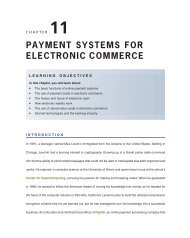ELECTRONIC COMMERCE SOFTWARE
ELECTRONIC COMMERCE SOFTWARE
ELECTRONIC COMMERCE SOFTWARE
You also want an ePaper? Increase the reach of your titles
YUMPU automatically turns print PDFs into web optimized ePapers that Google loves.
400<br />
Chapter 9<br />
The HostIndex site provides a convenient collection of Web pages that compare Web<br />
hosts. TopHosts.com and HostSearch also provide comprehensive link collections to<br />
companies researching Web hosting alternatives and services. Major Web directories can be<br />
helpful sources; the Google Directory of Web Host Directories is especially<br />
comprehensive.<br />
When making Web server hosting decisions, a company should ask whether the hardware<br />
platform and software combination can be upgraded when the traffic on its Web site<br />
increases. A company’s Web server requirements are directly related to its electronic commerce<br />
transaction volume and Web site traffic. The best hosting services provide Web<br />
server hardware and software combinations that are scalable, which means they can be<br />
adapted to meet changing requirements when their clients grow.<br />
BASIC FUNCTIONS OF <strong>ELECTRONIC</strong><br />
<strong>COMMERCE</strong> <strong>SOFTWARE</strong><br />
The size and objectives of electronic commerce sites vary greatly; thus, a variety of software<br />
and hardware products are used to build those sites. At the inexpensive end of the<br />
spectrum of electronic commerce solutions are choices such as externally hosted stores<br />
that provide software tools to build an online store on a host’s site. At the other end of the<br />
range are sophisticated electronic commerce software suites that can handle high transaction<br />
volumes and include a broad assortment of features and tools.<br />
The type of electronic commerce software an organization needs depends on several<br />
factors. One of the most important factors is the expected size of the enterprise and its projected<br />
traffic and sales. A high-traffic electronic commerce site with thousands of catalog<br />
inquiries each minute requires different software than a small online shop selling a dozen<br />
items. Another determining factor is budget. Creating an online store can be much<br />
less expensive than building a chain of retail stores. The start-up cost of an electronic<br />
commerce operation can be much lower than the cost of creating a brick-and-mortar<br />
sales and distribution channel that includes warehouses and multiple retail outlets. A<br />
traditional store requires a physical location with leases, employees, utility payments,<br />
and maintenance. The cost of creating the infrastructure for an online business can be<br />
much lower.<br />
Another early decision is whether the company should use an external host or host the<br />
electronic commerce site in-house. Companies that have an existing information technology<br />
(IT) staff of programmers, Web designers, and network engineers are more likely to<br />
choose an in-house hosting approach. If a company does not have or cannot easily hire<br />
people with the skills required to set up and maintain an electronic commerce site, it can<br />
outsource all or part of the job to a service provider. Companies that are located outside<br />
of major metropolitan areas and want to host sites themselves must also consider whether<br />
their Internet connections are sufficient. In many cases, these companies find that they<br />
are not close enough to a major Internet access point or that their connections do not have<br />
sufficient bandwidth to handle large volumes of traffic efficiently. Even if these companies<br />
have employees with sufficient skills, they might decide to use a service provider to host<br />
their electronic commerce sites.



